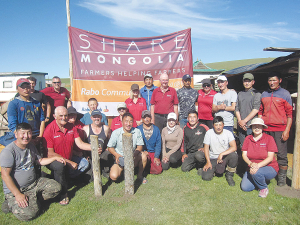Farmer confidence dips slightly, but positivity still dominates
Farmer confidence has taken a slight dip according to the final Rabobank rural confidence survey for the year.
 A recent visit by the New Zealand shearing training initiative Share Mongolia helped around 100 local sheep herders improve their shearing skills.
A recent visit by the New Zealand shearing training initiative Share Mongolia helped around 100 local sheep herders improve their shearing skills.
More than 100 Mongolian sheep herders have advanced their shearing skills following a recent visit by the New Zealand shearing training initiative Share Mongolia.
Established in 2020 to introduce modern shearing techniques and equipment to Mongolia, the first courses were trialled in Mongolia last year. The latest courses took place during June and July with a 12-strong touring party composed of Rabobank staff and New Zealand farmers.
A recent UNIDO (United Nations Industrial Development Organisation) report found that up to 9,000 tons of Mongolian wool was wasted each year due to limited resources and capacity and that machine shearing could create 4,000 jobs.
Paul Brough, Rabobank agribusiness manager and a leading figure in the programme's formation, says the team - split into three groups to expand their reach - was able to deliver seven five-day courses to 112 Mongolian herders across seven provinces.
"There was a good mix of ages, with some herders returning for their second year of training, and several women also participating," Brough explained.
"The majority had little or no experience with machine shears, but they picked up using the electronic handpiece really well. By the end, most were able to shear a sheep in five minutes - much quicker than the 25 minutes they were taking at the start."
While in Mongolia, the New Zealand touring party lived with local herders, sleeping in gers (tent dwellings) and learning about local culture and traditions, including taking part in the Naadam festivals (Mongolia's biggest holiday).
Brough says with an estimated 30 million sheep in Mongolia, there is huge scope for improving economic income by sharing New Zealand farming knowledge and expertise. He adds that the programme is now attracting interest of overseas companies keen to source Mongolian wool.
The touring party was joined on their travels by the four Mongolian herders who had visited New Zealand earlier this year as part of the initiative. They took on assistant training roles in the latest round of courses and helped with the language barrier.
Brough said it was great to see Budee, Baaska, Ama and Khanda again, visit their homes and spend a couple of nights with their families.
"Khanda and Ama have started a commercial shearing business together utilising one of the mobile shearing trailers we set them up with. Meanwhile, Baaska and Budee are also working as shearers in their local regions," he added.
"The skills and money they acquired during their trip to New Zealand has had a huge impact on their lives and they are now wealthy people by local standards."
Now shearing up to 200 sheep a day compared to the 25 prior to their New Zealand visit, means their quicker shearing means it is now economically viable to shear lambs, adding even more value to their herds.
Brough believes that with a bit more time, the goal is to have the four of them run the training courses themselves.
Brough says planning is already under way for course in 2024 which might expand to cover other topics including wool handling, pressing and other animal health practices such as sheep dipping.
"A lot of the herders who attended the courses are very keen to come to New Zealand for a stint working here.
"If wee can raise the funding, we could have up to 10 herders heading over this way early next year."
Each areas course participants have been left with five shearing machines and a grinder to put their new skills into practice. Share Mongolia aims to raise more funds to supply more shearing equipment in the months ahead to fll local needs.
The World Wide Sires National All Day Breeds Best Youth Camp Best All Rounder plaudit has become family affair, with 2026 Paramount Cup winner Holly Williams following in her sister Zara's footsteps.
DairyNZ is giving New Zealand farmers a unique opportunity to gain hands-on governance and leadership experience within the dairy sector.
Herd improvement company LIC has posted a 5.2% lift in half-year revenue, thanks to increasing demand for genetics.
According to the latest Fresh Produce Trend Report from United Fresh, 2026 will be a year where fruit and vegetables are shaped by cost pressures, rapid digital adoption, and a renewed focus on wellbeing at home.
The Roar is a highlight of the game hunting calendar in New Zealand, with thousands of hunters set to head for the hills to hunt male stags during March and April.
OPINION: The past few weeks have been tough on farms across the North Island: floods and storms have caused damage and disruption to families and businesses.